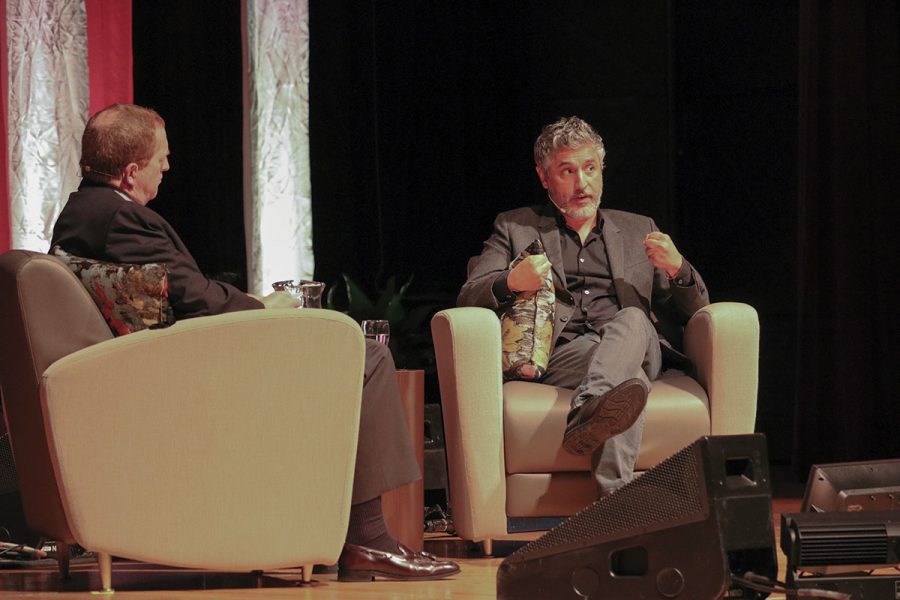Reza Aslan discusses religion, storytelling at Bryan Series
“When you’re an immigrant, ‘I want to be a writer’ is not something you tell your parents who basically gave up everything to come here,” said Reza Aslan, author and religious studies scholar, to a laughing audience. “I told my mom what I wanted to do with my life was write, and she said, ‘Who’s stopping you from writing? You will become a doctor, and then you will write.’”
On Sunday, Jan. 2, Aslan was the featured guest for 2018’s first Bryan Series event. As the first Bryan Series speaker to lecture in Dana Auditorium since 2005, Aslan discussed his background, writing, religion and identity in a talk entitled “The Intersection of History and Faith.”
Born in Iran, Aslan and his family immigrated to the United States in 1979 in the midst of the Iranian Revolution. Aslan realized he wanted to be a writer after reading Fyodor Dostoyevsky’s “The Brothers Karamazov.”
“I went to a terrible public high school, and I realized very early on that I’d have to put my education into my own hands if I was going to get out of that situation, and that was partly by reading books,” Aslan said. “I finished (‘The Brothers Karamazov’), and I thought to myself, ‘This is how I want to make people feel. I want to make people feel the way Dostoyevsky made me feel. I don’t really care how, but that’s what I want to do.’”
A recurring theme in Aslan’s talk was the importance of stories.
“I’m fascinated in the ways stories help us define who we are,” said Aslan. “Stories are how we understand who we are, how we understand our world. Storytelling is an enormously important function.
“Religion is a form of storytelling, but politics is also storytelling. Law isn’t just statutes written on pieces of paper, they’re a story we tell about our values, what matters to us as a nation and people.”
Aslan also touched on the difference between religion and faith and the function of religion as a language.
“Faith is mysterious. It’s indefinable, it’s ineffable, it’s deeply individual. It’s fundamentally an emotion. Like any emotion, it’s not a rational response, it’s an experiential response,” Aslan said. “Religion is the language we use to express faith. It’s a means of communication more than anything else.
“If you speak my language, then we shared a moment, a bond, that I can’t really put into words. We shared an emotion that the two of us have, that goes beyond the mundane language available to me. The feeling is universal. Religion is just how we talk about (that).”
The way Aslan spoke about religion and its forms of expression resonated with some students.
“I used to not take seriously the way people would be like, ‘I’m spiritual, but not religious,’ because I viewed religion as a source of spirituality, so it was like they were belittling religion,” said sophomore Tibaria Alnouri. “The way he said, ‘Religion is a language, and primarily an identity,’ it made sense to me.”
After his talk, Aslan took questions from the audience in which he addressed the ever-evolving ways in which faith is expressed in the contemporary world and how the United States is shifting.
“There is this overwhelming feeling in this country that this thing we have is permanent. Immigrants don’t think that way. I was raised in a country that was one way one day, and a completely different way the next,” Aslan said. “It’s not an exaggeration to say we are facing an existential crisis in this country.”
Aslan concluded his talk by conveying the sentiment that it is imperative to speak up in modern America.
“I feel like one day soon, we will be asked, ‘What did you do when this happened?’” said Aslan. “If you have any kind of voice, and you are not using it to shout ‘fire’ at the top of your lungs, then we deserve to have the house burn down on top of us.”
Sophomore Mallory Cerkleski related to Aslan’s closing words.
“(Aslan) said history is watching us,” said Cerkleski. “I think about that all the time.”









